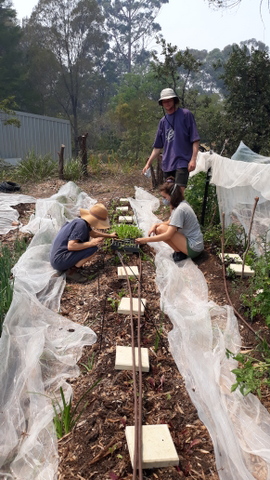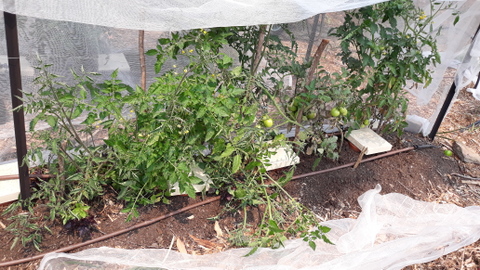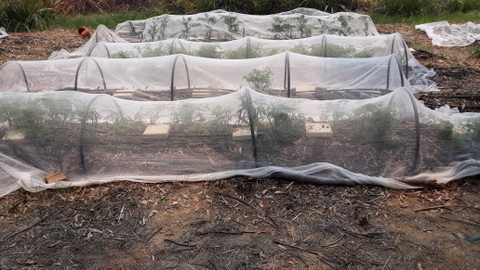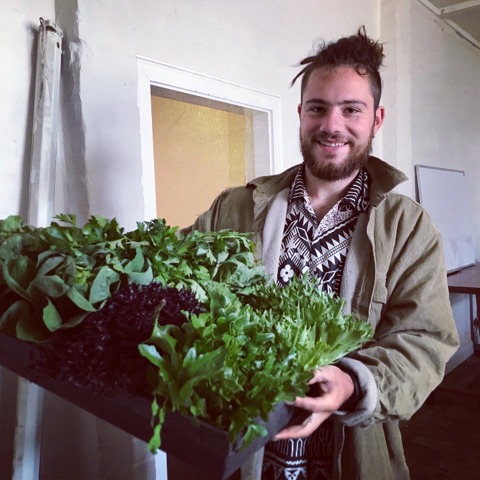
The Farm it Forward initiative grew out of the work done at the Lyttleton Stores Co-operative, which was developed to sell and distribute local organic produce grown in the Blue Mountains (west of Sydney) where backyard growers could swap their excess homegrown produce for store credit.
The fly in the ointment, as it were, was that there wasn’t enough excess produce! Manu noticed that people who were interested in becoming involved as registered backyard growers for Lyttleton Stores usually fell into one of three broad categories:
1. Older people who had the land and wanted to be productive, and were excited by the prospect but lacked the physical capability, and the help of others to get it up and running. They did, however, enjoy the social interaction with Manu and the Lyttleton team.
2. Young parents with small children who were in the first stages of starting a food garden or already growing but were time poor, and
3. People with established fruit trees, who could provide a decent amount of home grown fruit for the coop, but as they got older found it difficult to keep up with the demands of backyard growing.
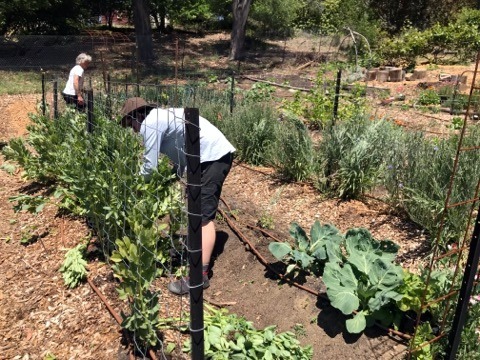
There was also a group of young people who would hang out at the community hub at Lyttleton Stores, they were very ecologically-minded and very in touch with the natural systems around them, but had no job opportunities in the mountains in the areas they were interested in and passionate about. They wanted to grow food and be more resilient but with land prices being what they are could not afford to buy land themselves.
So what if there was a social enterprise that could be able to put two to four young farmers through training to give them the skills to grow regeneratively, allow them to be paid part time (10 to 12 hrs per week), and grow food in the backyards of people who were interested in being part of the program? And in return for their support, allow people who owned the backyards to receive a box of organically grown produce per week?
Thus ‘Farm it Forward’ was born!
The idea behind Farm it Forward was that it would be a replicable system, developed with the help of a volunteer team member who happened to be database guru. They are currently recording all of their data on database systems and spreadsheets (including Google Sheets integration) so that they can fine tune their systems to iron out the bugs and work the best they can, then make it available open source to anyone who wants to start a ‘Farm it Forward’ enterprise in their own local area.
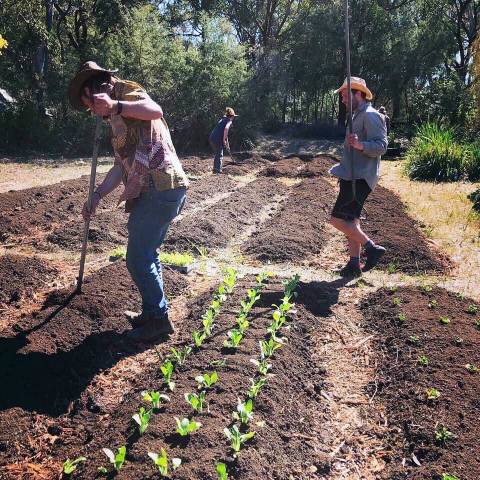
The system is set up so that they can record plantings and harvests using their phones, helping them keep track of how much of a type of produce is being grown where. The job of coordinating different crops being grown in different small scale market gardens in separate locations can be quite difficult, so they are developing their own tools to make the process easier, then field testing them before making them available for others to use.
The work also involves keeping track of the very efficient timed drip irrigation set up on each plot, which keeps the crops watered for 30 minutes to 45 minutes every day at the moment (late sprng), although this will need to be increased as the weather warms up. The team also physically check on how the irrigation etc. are running every two to three days. The bulk of the work is harvesting and delivery to Lyttleton co-op, a local cafe and a local restaurant, which is carried out twice each week.
To provide mentoring and training in regenerative growing techniques for the (currently) 3 three young farmers, three experienced growers have come on board –
- Sonya – who was a market gardener in the US for 3- 4 years and who is also the fresh produce coordinator for the Blue Mountains Coop,
- Lizzie and Gee – who run Piccolo farm, a small community supported agriculture farm, which is run on organic principles but is currently not certified, and
- Cameron – The farm manager at Warrah Farm, (which is linked with Warrah Society Disability Services) in Dural, which is a biodynamic farm.
Initially 4 plot owners showed interest in the program and these were set up to commence growing in spring of 2019. One was an old tennis court. All told at the current time the program has 6 plots of land which add up to one and a half acres in total. Two plots are on tank water and the other 4 are on town water, but use very efficient drip irrigation. Most plots are in the mid-mountains but one is in Blackheath (west of Katoomba).
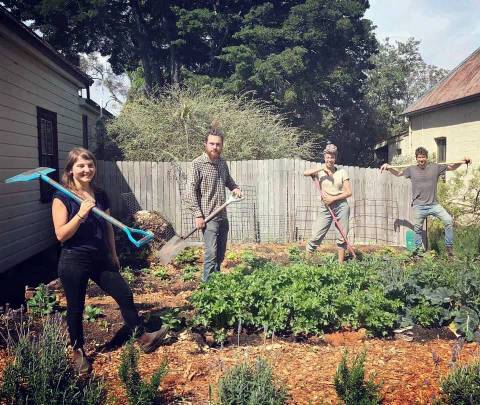
Mulch is used extensively on the plots, in contrast to the usually bare soil of conventional market gardening, including wood chip mulch to reduce water consumption further.
One thing which the operators of the program did not anticipate was the level of voluntary community participation. Volunteers, not directly participating in the program, have come from all over the area to provide labour to make the program a success. Once a week the get together to help with harvesting, weeding, cultivation and other odd jobs required to run the program. The program participants (often older people as described above) also have the positive impact of contact with younger people several times a week, so the program is also providing an antidote to social isolation for these residents.
Early on in the process of developing FiF, they contacted Blacktown and Blue Mountains Youth College, who provide alternative school for disadvantaged kids who are struggling in the mainstream system, to get them through to their HSC. A group of between 5 and 10 of these students come every Thursday to the Blackheath plot to volunteer. One of the kids has now been offered a paid Summer job working on the FiF gardens.
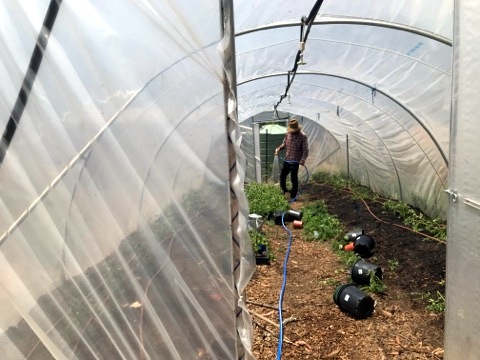
All produce from the plots which is not returned to the residents in the form of weekly food boxes, is sold to local co-ops, including Lyttleton Stores, Blue Mountains Co-op plus a local café and a local restaurant. This provides a small revenue stream coming back in to FiF. They also grow free produce for Blue Mountains Food Rescue and Blackheath Public School.
So far they have been able to grow 90kg of produce from the beginning of spring to now, as at November 2019.
The plots in the mountains (especially the one in the upper mountains at Blackheath) will be concentrating on spring, summer and autumn growing. Due to the slow down in growth during the winter season, other revenue streams are being explored for this time. The intention for FIF during the winter is to run workshops on waterwise growing strategies and water efficient irrigation techniques including making ollas, drip irrigation etc. A Introduction to Permaculture Design Course is also on the drawing board as a winter activity, as well as one-off food garden installations.
Planning is also underway to introduce Greensmart pots to residents who may have mobility problems, the pots have a wicking capability to ensure efficiency of water use but allow the growing of produce in such a way that the pots are easy to move around.
To finance the start-up of Farm it Forward, they were able to get a series of grants from –
● Blue Mountains Food Co-op
● Blue Mountains Council
● Bendigo Bank
● NSW Government Youth Opportunities Program
Due to the fact that there are issues in the Blue Mountains around an aging population with poor diet and mental health plus social isolation, a social enterprise of this kind, which works towards correcting these issues, has been provided with funding to encourage the development of the required systems.
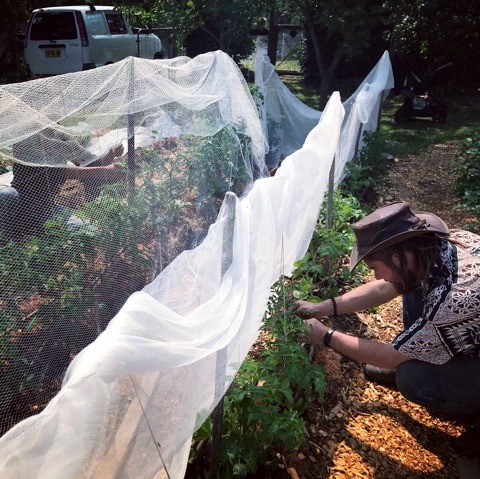
The Farm it Forward model can also act as a bridge between our current, ‘consumption at all costs’, mode of living and a more sustainable, satisfying home based lifestyle such as the one described by David Holmgren in his book, RetroSuburbia.
Currently, to support the enterprise, the team are developing documentation and tools. Once everything has been well and truly tried and tested, all this data will be released at the end of Winter 2020, open source for others to be able to replicate their success.
Back before Christmas (2019) I was privileged to watch some of the Farmit Forward volunteers installing ollas in the area which used to be a tennis court. The conditions were really bad due to the bushfire smoke and heat, but still they kept working!
